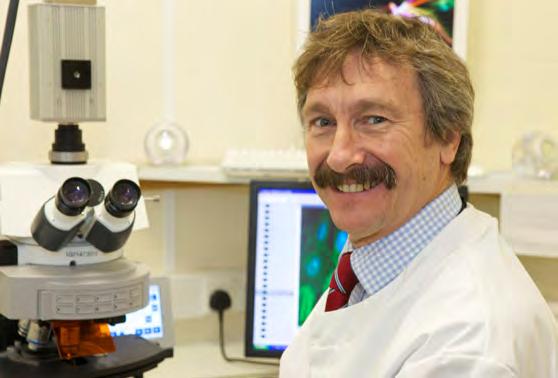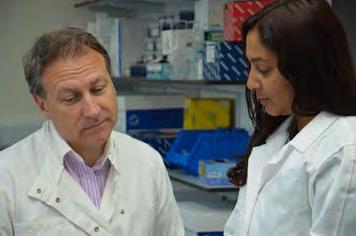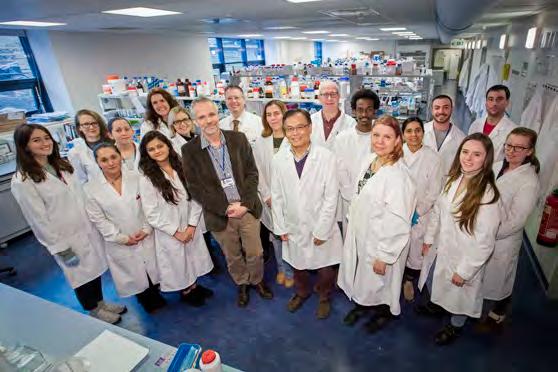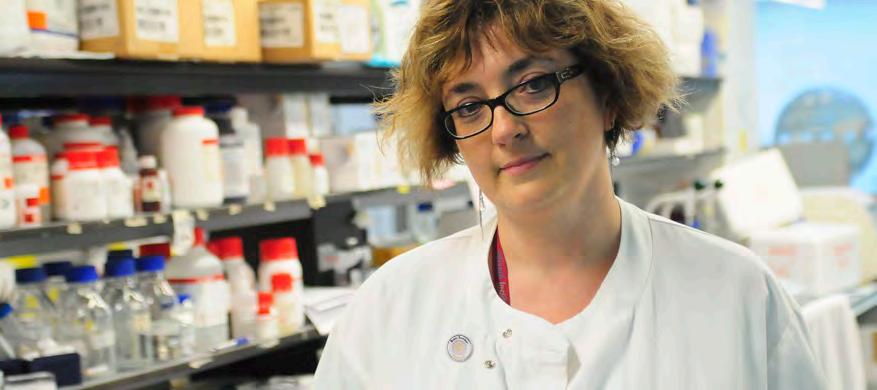
4 minute read
A decade of building research capacity
A DECADE OF BUILDING Our mission is to build a network of experts in sustainable research RESEARCH at dedicated UK Centres whilst influencing the Government and CAPACITY larger cancer charities to invest more nationally.
We were delighted to launch our first Centre at the University of Portsmouth in 2010. After a stringent peer review process, we selected three further Centres, which were launched in 2014 and 2015. With secure long-term funding covering the key salaried positions within these Centres, the researchers are able to pursue the sustainable and continuous research so desperately needed by the scientists and clinicians working in this historically underfunded field. The researchers at our four dedicated UK Centres are working together to gain a greater understanding of brain tumours and to identify ways in which they can be treated effectively. Our funding strategy means that we are investing in long-term research, building the ‘critical mass’ of expertise needed to accelerate the journey to find a cure. In turn, this facilitates increased research investment from other sources and grows the overall capacity for brain tumour research within the UK. It is essential that we fund long-term research into this devastating disease. Despite advancements for many other types of cancer, treatment options for brain tumours are still very limited, largely due to the historic underfunding for research into neuro-oncology.
With your help, we will change this.
We have partnered with world-leading experts to establish game-changing partnerships at key universities in the UK

HELPUS

to continue to fund long-term, life-saving research

Queen Mary University of London
Led by Professor Silvia Marino, the first female President of the British Neuro-Oncology Society, researchers at our Queen Mary University of London Brain Tumour Research Centre have developed new ways of analysing brain tumours using artificial intelligence alongside neuropathology techniques, in which samples from the tumours and healthy brains of patients can be directly compared. This highlights differences that are most important to target with new personalised drug treatments. Experiments to validate these findings at pre-clinical level are now required to then move the most promising targets into clinical trials for adult glioblastoma multiforme (GBM) brain tumours. The Centre is also expanding its research into paediatric medulloblastoma. We were delighted to have the team’s research validated as outstanding in the quinquennial review that took place in May. Our influential peer review panel members were impressed.
University of Plymouth
Professor Oliver Hanemann’s team at the University of Plymouth has established one of Europe’s leading low-grade brain tumour research centres where it is identifying new ways to categorise meningioma, including using a blood test that could avoid the need for biopsies. The new data is informing the testing of personalised drug treatments. Its work in schwannoma and glioma brain tumours is following similar paths, with an emphasis on targeting the role of the immune system and tumour microenvironment, whilst also looking at tumour initiation. The team has already completed early stage clinical trials, with more to follow.
Imperial College London
Pioneering Consultant Neurosurgeon, Mr Kevin O’Neill, alongside Senior Research Fellow, Dr Nelofer Syed, lead our Centre at Imperial College London. Their focus is on a metabolic approach to cancer treatment and they have moved research on arginine depletion out of the lab and into early stage clinical trials with encouraging results. The teams continue to develop surgical techniques including Raman spectroscopy, whilst artificial intelligence is enabling them to study long-term survivors and identify patterns to inform future research.
Keep up-to-date with all the latest research news about brain tumours on our website: www.braintumourresearch.org/ research-news
University of Portsmouth
Established by world-renowned Professor Geoff Pilkington, the team at our Brain Tumour Research Centre at the University of Portsmouth has developed all-human 3D models of the blood-brain barrier and the vasculature of the brain that not only enhance research, but also reduce the need for animal models to be used.
Its work on drug repurposing has identified a number of potentially effective compounds, with clinical trials in children and adults already at the planning stages.
University of Southampton – BRAIN UK
Initiated by brainstrust in 2011, the University of Southampton houses BRAIN UK, a virtual tissue bank, which we are proud to fund with the support of our Member Charity, Charlie’s Challenge. Its database catalogues a wealth of data about brain tumour samples held within the UK’s network of NHS and Academic Pathology Centres. It now achieves almost 100% coverage of the national population and therefore represents a globally unique population-wide resource. BRAIN UK also offers a ‘fast track’ ethics approval service, enabling research to begin more quickly than would otherwise be possible.










